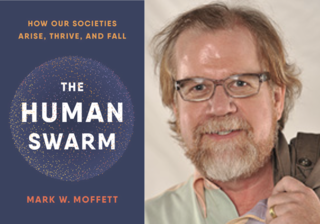Identity
Society and Identity
As social animals, membership in a society is key to how we form our identity.
Posted January 12, 2021
The following is "Part Two" of an interview with zoologist and explorer Mark W. Moffett, an expert on human and animal societies, about his new book: The Human Swarm: How Our Societies Arise, Thrive, and Fall. Responses have been lightly edited and links to supporting references were provided by Dr. Moffett. (Also check out Part One: How Societies Survive)

Q: You claim being part of a society doesn’t imply more intelligence. Doesn’t this go against everything we’re told about how sociality drives big brains?
One advantage of being in a society is you don’t need to do everything on your own. A person can focus on a job he or she enjoys, such as cooking, while remaining ignorant about other skills, like how to construct a home or defend from enemy attack. No solitary creature has that luxury. It has to carry out all the tasks necessary to keep itself alive. This self-reliance may be why loner species like bears seem to be so smart, at least as measured by their skill at things like puzzle solving. Human brains have shrunk since the days of hunter-gatherers when everyone in a society could be a jack-of-all-trades. A plausible explanation is that we have come to be coddled in societies now that just about everything is done by specialists, leaving us all that time in the evenings to enjoy Netflix.
Q: We know that "race" is not a meaningful genetic or biological category, yet in your book, you claim that we not only use race as a marker of identity (or more accurately, a dramatic simplification of identity that emphasizes slight physical differences) but that we are fully “obsessed” with race. Why is this?
I conclude in my book that race is real—but only in our heads. The various "races" aren’t biologically meaningful. Rather, they are our attempt to boil down innumerable complicated origins to a few easy-to-spot designations. Our brains use a trick to avoid being overwhelmed by complexity: We form categories, even where no such tidy groups exist. We do that for just about everything, not just race. Our simplistic racial categories are one of the shortcuts the human mind devises in response to living around so many people whom we don’t know personally, and are only a serious problem when we apply negative biases and act on them.
Q: What are the limits that you see in multicultural melting pots?
It’s hard to say if there are limits. Certainly a country like the United States has brought a huge number of ethnicities into the fold, originally by force (through slavery of Africans and conquest of Native Americans) and then voluntarily, through successive waves of immigration. The difficulty is in managing the relations between groups, given our hypersensitivity to differences and tendency to connect them to negative biases and mistrust. What happens in practice is that when many groups coexist, we tend to clump them into broader categories of “other”—that’s how the idea of “races” sprung into existence. After all, the members of each race had originally belonged to a myriad of distinct societies; for example, African tribes in the case of black people, whose names are forgotten with passing generations. When the diversity exceeds what the members of a society can readily grasp, there tends to be more “melting.”
Q: What does our behavior in the time of COVID-19 tell us about human identities and our responses to threats?
Unless you or someone you love has had COVID, the threat of an invisible virus feels far less real than that of being struck by a car. Perhaps as a result, many people appear to treat wearing a mask as more of a social expectation than an act meriting constant vigilance. So here in Brooklyn, at the height of the pandemic, I see folks pull off their mask when talking, or pat a passing friend on the back, or push by others in a shop.
Buckling a seatbelt didn’t come automatically at first, either. It took years of reinforcement that we don’t have the luxury for today: While a car crash is over in an instant, persons hit by a virus can spread it to others even if they don’t get ill themselves, and down the line some of those others can die.
Once a behavior is perceived as intruding on our sense of identity as a social group, rather than a necessity in the face of an intangible danger, like global warming or a virus—people can all too willingly accept the idea that the rule has been foisted on them for reasons they don’t trust. The choice to don a mask turns into a symbol of who the person is, making him or her seem almost foreign to those who disagree—in extreme cases, almost as if the mask was one of the yellow bands Jews were forced to wear in the Nazi regime. For COVID-19, this mental transformation is all the easier because people tend to associate disease with outsiders. To mention one of many examples, a 2004 study at University of British Columbia showed that most individuals feel a greater dislike of immigrants after looking at photographs of germs and waste. Clearly, our identities influence not only who we are but much of what we do.
Q: You write that the European Union will never substitute for its internal nations and it will never become a whole society. Yet, I personally know many who are fighting hard for common and unified European values, even against their fellow countrymen. Is there another side to this?
People vary in their feelings and outlooks—some even come to reject the society of their birth and move elsewhere (though changes in citizenship seldom come easy). Relatively few individuals think of the EU—or the UN, or any other transnational organization—with the emotional commitment they show their nation, with its grand history, shared language and culture, venerable symbols and traditions and so on. Healthy societies can form alliances, in humans and some other species, but they never completely merge of their own free will. Now, there will be periods when the social importance of the EU rises to the fore, with many experiencing pride in the larger association. But, given the evidence from biology, psychology, and history, that depends on circumstances and is fragile compared to our devotion to nations.
The Human Swarm doesn’t have a simplistic takeaway because I wrote it precisely to get people talking about questions like this one. So, thanks!




